During Christmas, Orthodox Christians greet each other with "Christ is born!" and respond with "Glorify Him!" This exchange celebrates the joyous birth of Jesus Christ and reflects their shared faith. You'll hear variations like "Christ is among us," which highlight His presence in their community. These greetings start on Christmas Eve and continue until the Feast of the Purification. Each greeting emphasizes simplicity and togetherness, steering clear of commercial phrases like "Merry Christmas." This season is also marked by communal gatherings and acts of charity, making it a time of unity and joy. There's much more to discover about these traditions!
Key Takeaways
- Orthodox Christians primarily greet each other with "Christ is born!" and respond with "Glorify Him!" during the Christmas season.
- Variations like "Christ is among us" emphasize Christ's presence within the community and reflect local customs.
- Unique greetings are designated for specific feast days, maintaining the spiritual essence of the celebrations.
- Community engagement through local events and shared meals enhances the collective experience of the Nativity season.
- Simplicity and acts of charity during Christmas promote peace, goodwill, and a deeper spiritual reflection among families and communities.
Significance of Christmas Greetings
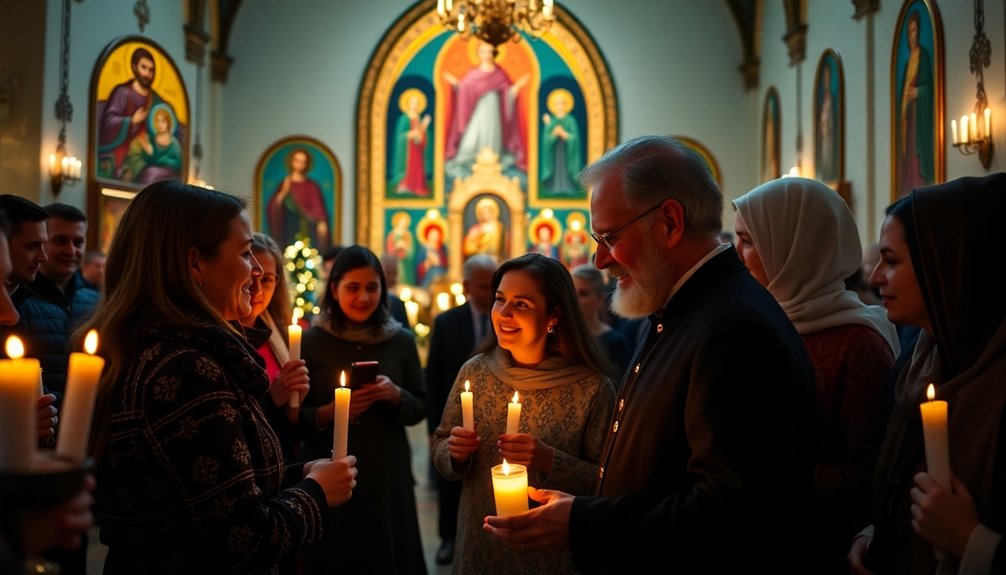
Christmas greetings hold deep significance for Orthodox Christians, serving as a vibrant expression of their faith. When you exchange greetings like "Christ is born!" and respond with "Glorify Him!" from Christmas Eve until the Feast of the Purification, you actively participate in a joyful proclamation of Jesus Christ's incarnation.
This practice isn't just about words; it fosters a sense of community and shared belief among Orthodox Christians, reinforcing your collective identity. These greetings stand in contrast to more commercialized expressions of the season, keeping the focus on the true meaning of Christmas.
Common Orthodox Christmas Phrases
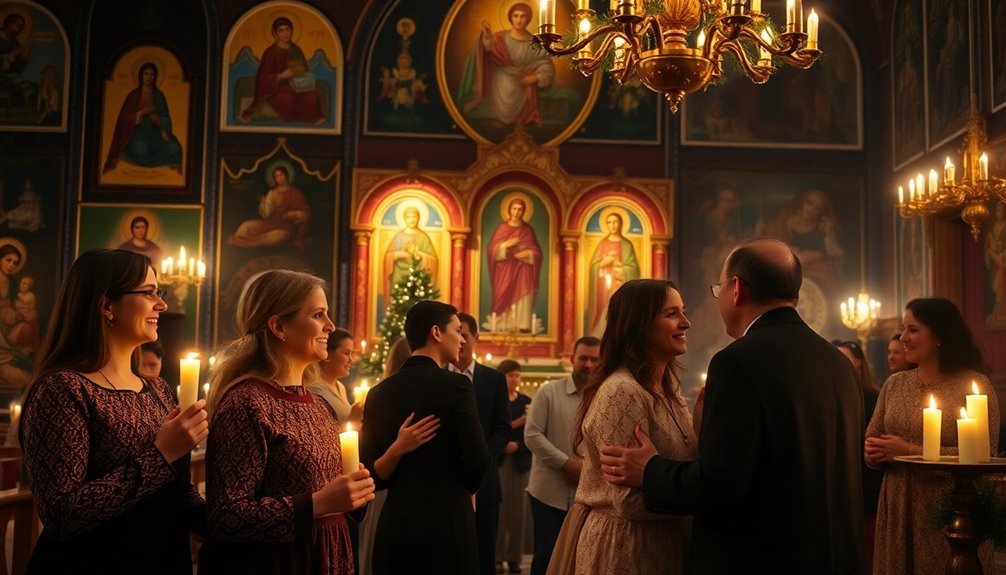
When you greet someone with "Christ is born!" and they respond with "Glorify Him!", you're participating in a beautiful tradition that highlights the essence of Christmas in Orthodox culture.
You might also notice variations in greetings that reflect local customs, all while keeping the focus on the significance of Christ's birth.
Understanding these phrases deepens your connection to the community and the shared faith during this holy season.
Traditional Nativity Greetings
During the Nativity season, Orthodox Christians joyfully exchange traditional greetings that celebrate the birth of Christ.
The most common greeting you'll hear is "Christ is born!" with the enthusiastic response "Glorify Him!" This vibrant exchange occurs from Christmas Eve until the Feast of the Purification, reflecting the joy of the season.
Another popular phrase is "Christ is among us," often said by priests, highlighting Christ's presence within the community.
In some traditions, when someone says "Christ is born!" the response can be "He is truly born!" to affirm the belief in the Incarnation.
These traditional Nativity greetings foster a sense of unity among Orthodox Christianity, connecting believers across various jurisdictions in celebration.
Seasonal Greeting Variations
As the Nativity season progresses, you'll find a rich variety of seasonal greetings within the Orthodox community. The most common is "Christ is born!" followed by the joyful response, "Glorify Him!" This greeting is exchanged from Christmas Eve until the Feast of the Purification, celebrating Christ's incarnation.
You might also hear "Christ is among us," often spoken by priests, emphasizing Christ's ongoing presence in your community. Additionally, some Orthodox Christians embrace modern expressions like "Merry Christmas," blending tradition with contemporary cheer.
If you're in the Carpathian region, expect unique phrases during the Theophany season, showcasing cultural nuances in how the faithful express their joy during this special time. Each phrase enriches the celebration of Christmas Day.
Cultural Contexts and Customs
While engaging with the rich tapestry of Orthodox Christmas greetings, you'll discover that each phrase not only conveys joy but also reflects unique cultural contexts and customs.
Here are three common phrases you might hear:
- "Christ is born!" – A heartfelt greeting exchanged from Christmas Eve until the Feast of the Purification, with the response "Glorify Him!"
- "Merry Christmas" – Often viewed as too commercial, this phrase is less favored within the Orthodox Church, emphasizing spiritual significance instead.
- "Christ is circumcised!" – A humorous nod used on January 1st, St. Basil's Day, showcasing local traditions.
These greetings deepen communal ties and highlight the shared celebration of Christ's Nativity across diverse Orthodox communities, enriching your understanding of this beautiful season.
Liturgical Context for Greetings
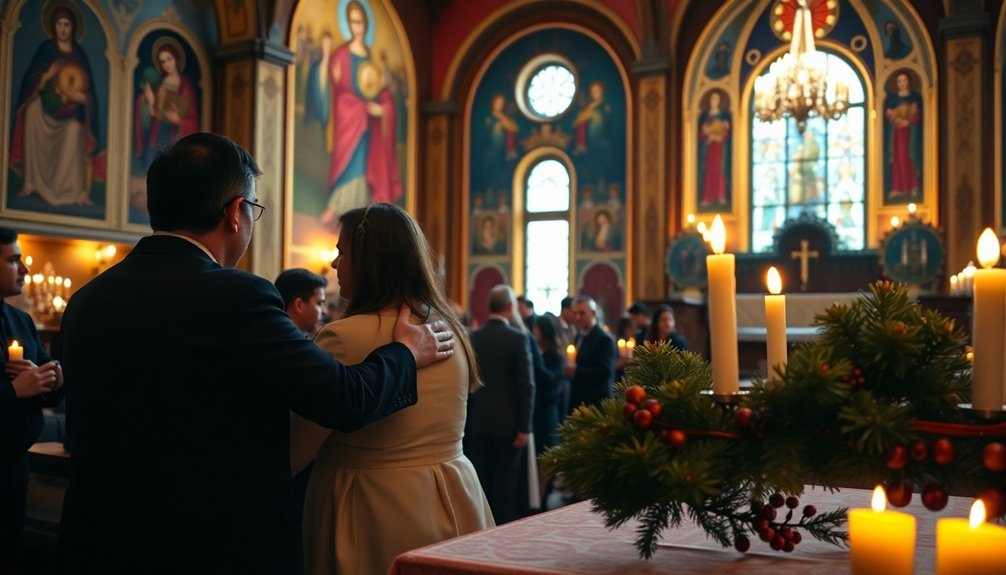
When you think about Orthodox Christmas greetings, it's crucial to reflect on their timing and how they change throughout the liturgical year.
From "Christ is born!" on Christmas Eve to "Christ is risen!" during Pascha, these phrases mark significant moments in the church calendar.
Understanding this context not only enhances your appreciation for the greetings but also deepens your connection to the community's shared faith.
Christmas Greeting Timeline
Understanding the timeline for Christmas greetings within the Orthodox liturgical context enriches your appreciation of the Nativity season.
From Christmas Eve until February 2, you'll joyfully greet others with "Christ is born!" and hear the response "Glorify Him!" This exchange captures the essence of the celebration.
Here's a glimpse of important moments:
- Christmas Eve: Begin the greeting as festivities unfold.
- Feast of the Purification (February 2): Conclude this joyful exchange.
- Ordinary Time: Use "Glory to Jesus Christ" with the response "Glory to Him forever!" to maintain the spirit of reverence.
These greetings keep the focus on Christ's presence, helping you connect deeply with the meaning of Christmas and beyond.
Seasonal Greeting Variations
As you explore the seasonal variations in Orthodox Christmas greetings, you'll discover how these expressions reflect both liturgical significance and cultural diversity.
The traditional greeting "Christ is born!" is exchanged from Christmas Eve until the Feast of the Purification, with the joyful response "Glorify Him!"
During this time, you may also hear unique regional variations, especially in Carpathian and Slavic traditions, showcasing local customs.
Beyond mere pleasantries, these Christmas greetings symbolize a communal identity, uniting Orthodox Christians in their shared celebration of the Nativity.
Additionally, you'll find that greetings align with the liturgical calendar, where specific phrases are designated for different feast days and seasons, enriching your understanding of Orthodox practice throughout the year.
Liturgical Significance Explained
While exploring the liturgical significance of Orthodox Christmas greetings, you'll find that these expressions are deeply rooted in the Church's calendar and theology.
The greeting "Christ is born!" reflects the joy of Christ's incarnation and is used from Christmas Eve until the Feast of the Purification. When you respond with "Glorify Him!", it emphasizes communal worship.
Here are three key points to remember:
- Liturgical Calendar: Each greeting aligns with specific seasons, enhancing your understanding of Orthodox Christian beliefs.
- Joyful Celebration: These greetings serve as joyful reminders of the Nativity and community identity.
- Theological Depth: The connection between Christmas and other events, like the resurrection, reinforces shared faith and doctrinal beliefs.
Variations Across Orthodox Traditions
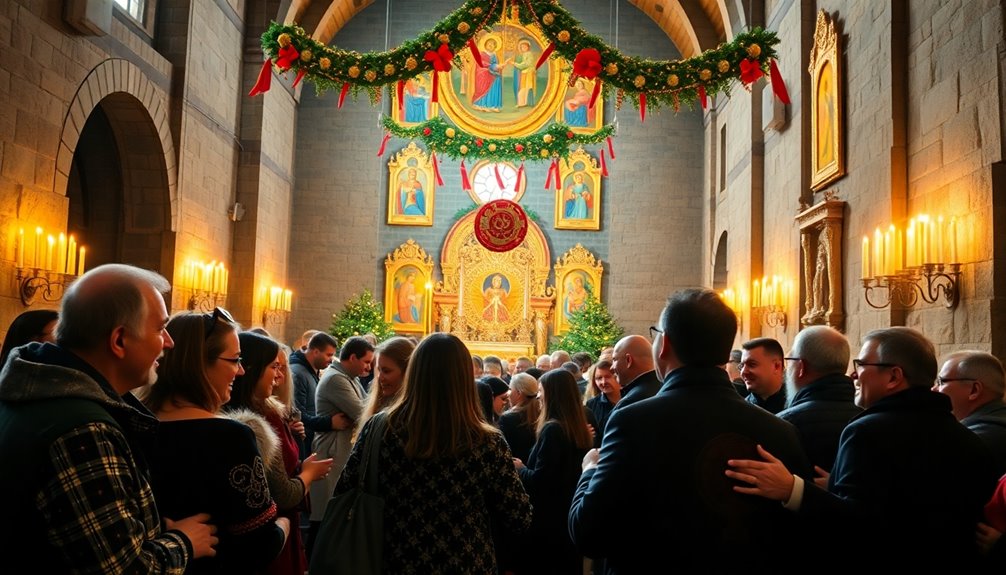
Across the diverse Orthodox traditions, Christmas greetings reflect a rich tapestry of cultural customs and spiritual significance.
In the Eastern Orthodox tradition, you'll often hear "Christ is born!" with the response "Truly He's born!" from Christmas Eve until the Feast of the Purification.
If you're in the Carpathian region, you might encounter unique greetings during Theophany, showcasing local celebrations.
Slavic Orthodox Christians also have regional variations, incorporating daily greetings related to the feast of the saint being honored.
Many Orthodox Christians steer clear of "Merry Christmas," as it carries commercial connotations, preferring traditional greetings that emphasize the holiday's spiritual essence.
Additionally, specific greetings are used on particular days, honoring liturgical traditions while adapting to local contexts.
Nativity Greetings and Responses

During the joyous Christmas season, Orthodox Christians warmly exchange the greeting "Christ is born!" followed by the heartfelt response "Glorify Him!" This tradition begins on Christmas Eve and continues until the Feast of the Purification, marking a time of celebration and reflection on Christ's incarnation.
As you partake in this festive spirit, envision:
- Families gathering around a Nativity scene, sharing stories of Christ's birth.
- Believers uniting in church, voices rising in harmonious praise.
- The warmth of candlelight illuminating faces filled with joy and hope.
These greetings emphasize community, reinforcing a sense of unity among Orthodox Christians worldwide.
As you share these words, you join a rich tradition that celebrates Christ's love and the miracle of His birth.
Role of Community in Celebrations
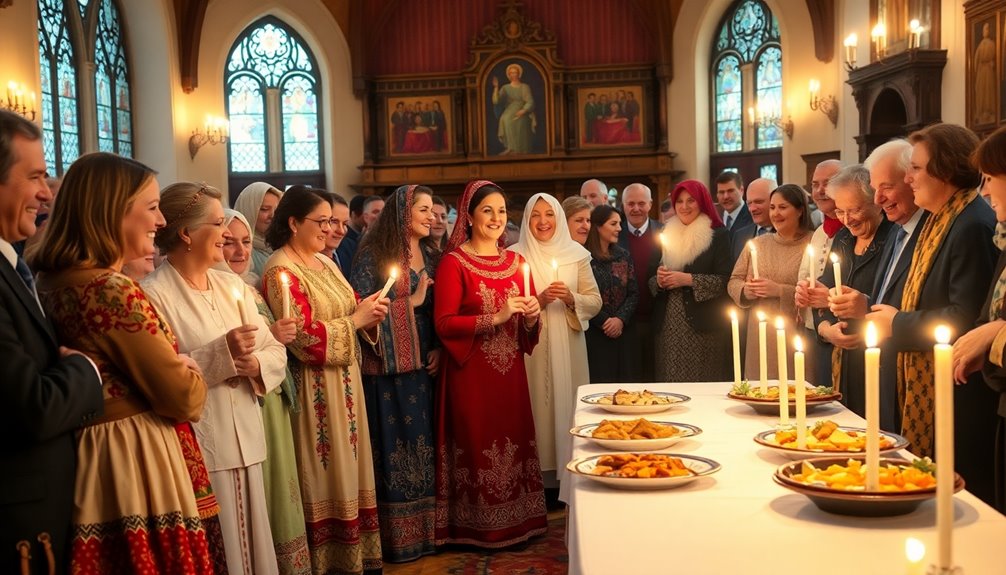
As you celebrate Orthodox Christmas, the role of community becomes clear, uniting families and friends in joyous traditions. The celebration of the birth of Christ emphasizes family unity and reconciliation, with greetings like "Christ is born!" fostering communal joy.
Local parishes are essential in promoting community engagement, offering events and services that bring members together for worship and charity.
Communal feasts filled with traditional foods strengthen bonds among families and neighbors, showcasing the importance of togetherness in Orthodox culture. Your participation in charitable acts, such as supporting local initiatives, reflects a commitment to generosity and collective responsibility.
Through Divine Liturgy and local customs, you deepen your sense of belonging within the larger church community during these meaningful celebrations.
Spiritual Reflections During Christmas
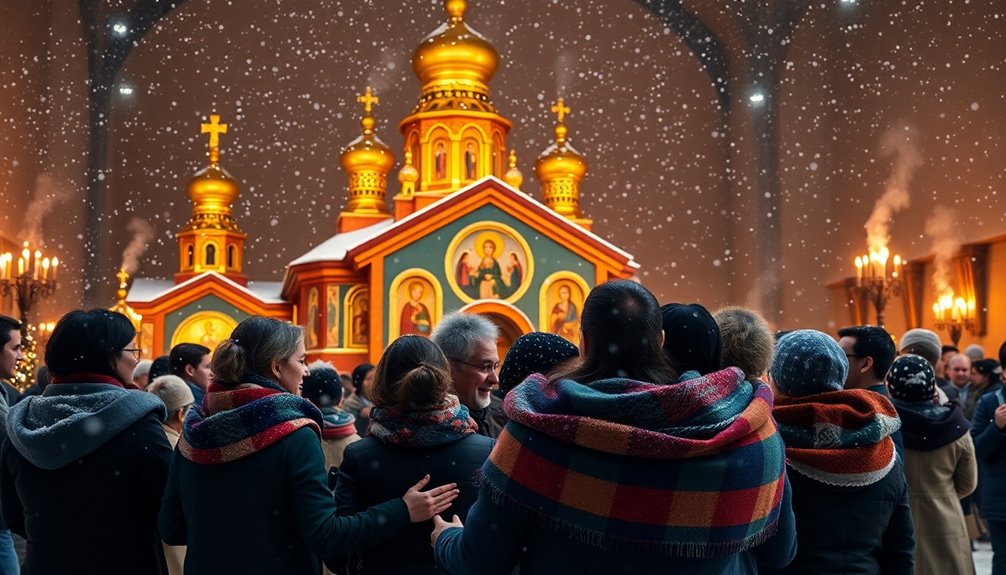
During Christmas, you can truly appreciate the meaning behind greetings as they reflect the joy of Christ's birth.
This season is a perfect time to engage in family traditions that encourage reflection and deepen your spiritual connection.
Meaning of Greetings
The exchange of traditional Orthodox Christmas greetings carries profound spiritual significance that transcends mere words.
"Christ is born!" followed by "Glorify Him!" serves as a joyful proclamation of faith, inviting believers to reflect on the miracle of Christ's incarnation.
This greeting, shared from Christmas Eve until the Feast of the Purification, embodies the essence of communal worship. It nurtures unity and strengthens your identity as part of the Church.
Consider these reflections during your celebrations:
- The warmth of community as you gather with loved ones.
- The light of faith illuminating the dark winter nights.
- The joy of worship, resonating in every heartfelt exchange.
These elements bring to life the spiritual depth of the Nativity season.
Spiritual Significance of Nativity
Christmas offers a unique opportunity for you to deepen your spiritual connection and reflect on the profound significance of Christ's Nativity. This sacred event emphasizes the incarnation of Jesus and the divine love expressed through His birth.
During this season, you're invited to engage in spiritual reflections that focus on reconciliation and forgiveness, urging you to mend relationships and strengthen family bonds. Orthodox teachings encourage prayer and scripture readings, enhancing your personal spiritual growth and understanding of the Christian faith.
You're also called to acts of charity, showcasing Christ's love through tangible support for those in need. Incorporating traditional prayers and customs fosters a reverent atmosphere, allowing gratitude to flourish in your heart during this holy time.
Family Traditions and Reflection
As families gather to celebrate the season, embracing spiritual reflections becomes a cherished tradition that strengthens bonds and nurtures faith.
Each family member plays a crucial role in fostering discussions about values and charity, deepening connections within the life of the church.
Consider these meaningful practices:
- Daily scripture readings that spark conversations about faith and the saints, enriching your understanding.
- Creating a Faith Capsule, filled with memories, drawings, and notes of gratitude to preserve shared experiences.
- Incorporating the Katavasia of Nativity into prayers, inviting reverence and gratitude into your home.
These traditions not only enhance spiritual growth but also build a loving community that thrives on faith and shared purpose during Christmas. Additionally, engaging in effective relaxation techniques can help create a peaceful environment conducive to spiritual reflection.
Family Traditions and Practices
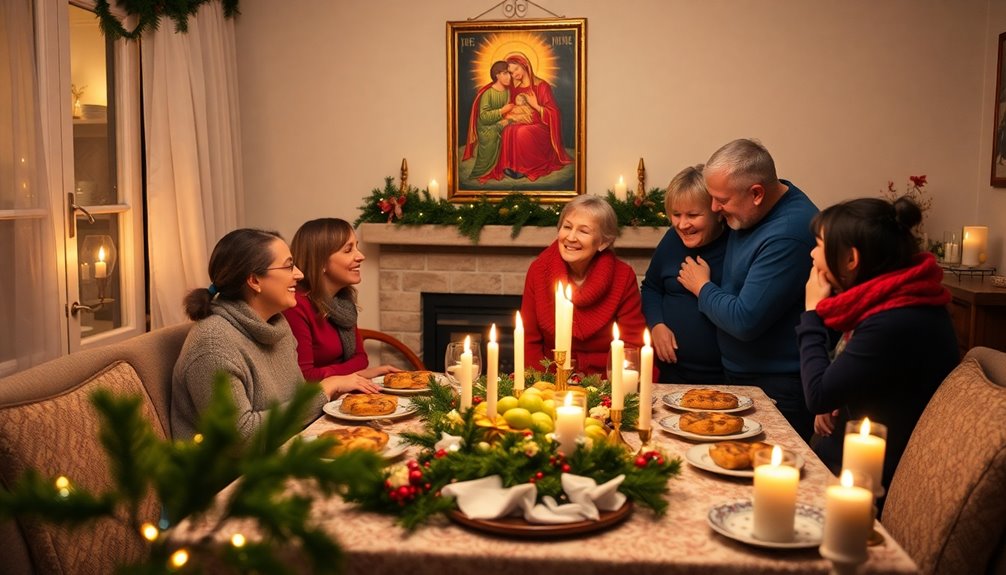
While celebrating the joy of the holiday season, Orthodox families often come together to embrace traditions that strengthen their bonds. These family traditions emphasize joy, reconciliation, and forgiveness, creating a sense of love and unity.
In the weeks leading up to Christmas, you might participate in customs like Detinjci, Materice, and Oci, where children tie their parents and receive gifts for good behavior.
On Christmas Eve, after a 40-day fast, your family enjoys a festive feast, leaving leftover food overnight to invite happiness. Christmas Day typically includes attending Morning Liturgy and sharing special foods like cesnica and pecenica.
Additionally, families honor the Virgin Mary on the second and third days, keeping the spirit of the season alive.
Engaging in Charitable Acts

Engaging in charitable acts during the holiday season not only enriches your spirit but also strengthens community ties among Orthodox Christians.
This beautiful tradition fosters goodwill and reminds you of the true essence of Christmas. Many Orthodox parishes organize initiatives that allow you to make a difference.
Consider participating in:
- Food drives: Donate non-perishable items to help families in need.
- Volunteering at shelters: Offer your time and compassion to those facing hardships.
- Fundraisers: Join efforts to raise money for local charities supporting children and families.
These charitable acts not only provide essential support but also deepen your spiritual connection with church members, reinforcing the values of love and generosity during this festive season.
Emphasizing Simplicity and Peace

Emphasizing simplicity during the Christmas season allows you to focus on spiritual reflection and the warmth of family connections rather than the distractions of materialism.
By embracing this simplicity, you create an atmosphere filled with peace and gratitude. Sharing the greeting "Christ is born!" followed by "Glorify Him!" fosters a communal spirit, enhancing joy among loved ones.
Engaging in prayer and devotion strengthens bonds, reminding everyone of love and unity. Orthodox customs, like leaving leftover food on the table, symbolize an invitation for happiness and blessings.
This celebration also inspires acts of charity and community service, reinforcing that peace and goodwill are central themes, allowing you to appreciate the true essence of the holiday.
Frequently Asked Questions
What Words Do Orthodox Say on Christmas?
When you celebrate Christmas in the Orthodox tradition, you greet others with "Christ is born!" This joyful proclamation reflects the significance of Christ's Nativity.
The customary response is "Glorify Him!" This exchange continues from Christmas Eve until the Feast of the Purification.
While some may say "Merry Christmas," it's less common. Using these traditional greetings connects you with the community and reinforces shared beliefs during this special season.
What Is the Response to Christos Voskrese?
When someone greets you with "Christ is risen!" (Christos Voskrese), what's your response?
You'd say, "Indeed, He's risen!" (Voistinu Voskrese), affirming the joy of Christ's resurrection.
This exchange isn't just a greeting; it's a celebration of faith that strengthens community ties among Orthodox Christians.
You'll find these words shared from Pascha until Ascension, reminding everyone of Christ's victory over death and the hope it brings to believers.
What Do Greek Orthodox Say at Christmas?
During Christmas, you'll hear Greek Orthodox Christians greet each other with "Christ is born!" It's a joyful expression that reflects the spirit of the season.
When someone says this, your response should be "Truly He's born!" This exchange lasts from Christmas Eve until the Feast of the Purification, emphasizing unity and celebration.
You'll find these greetings shared in family gatherings, liturgies, and festive meals, creating a warm, communal atmosphere.
What Is the Traditional Ukrainian Christmas Greeting?
You'll feel like you're soaring through the skies when you hear the traditional Ukrainian Christmas greeting: "Christ is born!"
This joyful exclamation is met with the enthusiastic response, "Glorify Him!"
You can use this greeting from Christmas Eve until the Feast of the Purification, embracing the festive spirit.
It's a beautiful way to connect with family and friends, highlighting the warmth and unity that Christmas brings to Ukrainian Orthodox Christians.
Conclusion
As you celebrate Christmas, remember that "it's the thought that counts." Embrace the traditional greetings and the rich liturgical context that make this season special across various Orthodox traditions. Whether you share joyful Nativity greetings or engage in acts of charity, the essence of Christmas lies in simplicity, peace, and love. Let these practices deepen your connection to faith, family, and community, creating cherished memories that last well beyond the holiday season.









